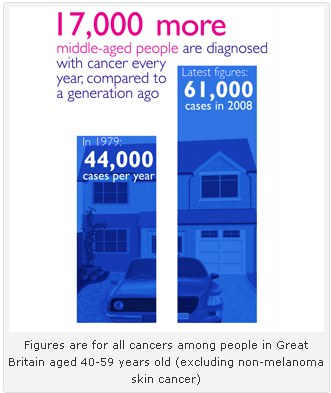UK cancer trends – The media has been all over the Cancer Research UK announcements on cancer rates. Specifically, the focus was on middle-aged people and the increases seen between 1979 and 2008.
NHS Choices, as ever, provides some rational words following the media frenzy and cites a few of the stats to which I’ve added percentages of diagnoses for comparison):
The highest rate of new diagnoses is among people aged 75 and over; the rate of new diagnoses in over-75s increased from 1,808 per 100,000 to 2,319 per 100,000. (That’s 1.8% in 1979; 2.3% in 2008).
In people aged 60 to 74, new diagnoses rose from 1075.9 per 100,000 to 1,370 per 100,000. (1.1% in 1979; 1.4% in 2008).
In people aged 40 to 59, new diagnoses rose from 329.1 per 100,000 in 1979 and 388.1 per 100,000 in 2008 (an 18% rise). (0.33% in 1979; 0.39% in 2008)
The lowest rate of new diagnoses is among people under 40; the rate in this age group increased from 29.5 per 100,000 in 1979 and 41.2 per 100,000 in 2008. (0.03% in 1979; 0.04% in 2008).
When looking at the rates of new diagnoses of specific cancers among people aged 40 to 59 years old, CRUK reports that: the rate of new cases of breast cancer in women has increased from 134 per 100,000 women in 1979 to 215 per 100,000 in 2008. The rates of new cases of prostate cancer among men has increased from 8 per 100,000 in 1979 to 51 per 100,000 in 2008. The rates of new cases of lung cancer in men dropped from 93 per 100,000 in 1979 to 35 per 100,000 in 2008. Moreover, despite the increases in diagnoses (actually, partly because of the increases in diagnoses), the number of people surviving cancer [for a reasonable time after diagnosis] has doubled since the 1970s. There were 2152 deaths from cancer per 1,000,000 people in GB in 1979, which fell to 1754 deaths from cancer per 1,000,000 people in 2008. I’m not sure what statistics the tabloids were focusing on with their scaremongering claims about cancer incidence, but they don’t mesh with what CRUK actually said.

NHS Choices points out that the causes of the increases were not directly investigated. However, CRUK say that one factor contributing to these increases is likely to be higher rates of detection due to the NHS breast cancer screening programme and the PSA test for prostate cancer. As opposed to chemicals, radiation, GM crops, sunspots, crop circles, or any other spurious causes. Of course, none of this should detract from the human pain and suffering of cancer, indeed it should be seen as a positive that although incidence is reportedly increasing this seems to be due to better diagnosis and life expectancy has improved because of better treatments because of the efforts of CRUK, other charities and the medical scientists they help support.
Related articles
- Cancer diagnoses in 40-59 age group soar 20% in a generation (guardian.co.uk)
- The cancer generation (thesun.co.uk)
- PSA Test May Help Check for Breast Cancer (webmd.com)